人教版高中英语必修5
人教版高中英语必修五Unit 5 First Aid
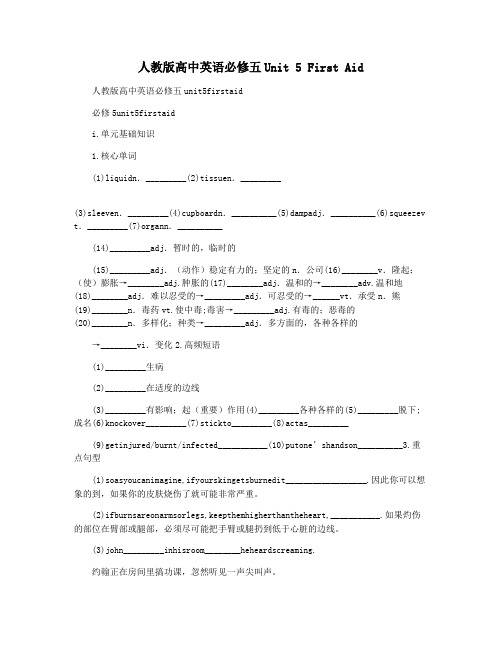
人教版高中英语必修五Unit 5 First Aid 人教版高中英语必修五unit5firstaid必修5unit5firstaidi.单元基础知识1.核心单词(1)liquidn._________(2)tissuen._________(3)sleeven._________(4)cupboardn.__________(5)dampadj.__________(6)squeezev t._________(7)organn.__________(14)_________adj.暂时的,临时的(15)_________adj.(动作)稳定有力的;坚定的n.公司(16)________v.隆起;(使)膨胀→________adj.肿胀的(17)________adj.温和的→________adv.温和地(18)________adj.难以忍受的→_________adj.可忍受的→______vt.承受n.熊(19)________n.毒药vt.使中毒;毒害→_________adj.有毒的;恶毒的(20)________n.多样化;种类→_________adj.多方面的,各种各样的→________vi.变化2.高频短语(1)_________生病(2)_________在适度的边线(3)_________有影响;起(重要)作用(4)_________各种各样的(5)_________脱下;成名(6)knockover_________(7)stickto_________(8)actas_________(9)getinjured/burnt/infected___________(10)putone’shandson__________3.重点句型(1)soasyoucanimagine,ifyourskingetsburnedit__________________.因此你可以想象的到,如果你的皮肤烧伤了就可能非常严重。
高中英语人教版必修5知识点汇总

必修5Unit 1 Great scientists核心单词1. characteristicn.特色;特性;典型adj.特有的,表示特性的;典型的Kindness is one of his characteristics.和善是他的特性之一。
A characteristic of the camel is its ability to live for a long time without water.骆驼的一个特点是不喝水也能活很长时间。
\易混辨析character/characteristiccharacter n.性格,品质(本身具有的);角色,人物;字体,字符characteristic n. 特点,特征(用以区别于其他事物的)2. defeatvt.击败;打败;使(计划、希望)落空Our team defeated our opponent by 5:0.我们队以五比零的比分战胜了对手。
He was defeated in his plan.他的计划失败了。
-易混辨析defeat/conquer/overcome三个词都含有“战胜”、“击败”的意思。
defeat指“赢得胜利”,尤其指军事上的胜利,如:defeat the enemy(打败敌人)。
conquer指“征服;战胜”,尤其指获得对人、物或感情的控制,如:conquer nature(征服自然)。
overcome指“战胜;压倒;克服”,尤其指“感情”,如:overcome difficulties(克服困难)。
defeat/beat/windefeat, beat都表示在战斗或竞赛中“战胜,打败(对手)”,后接竞争对手。
如:beat the competitor/the country/the team ...打败对手/国家/团队……》win也表示“战胜,赢得”,但它的宾语通常是比赛、战争、奖品或表示尊重、崇拜之类意义的词。
人教版高中英语必修五unit5 first aid language points课件 (共45张PPT)
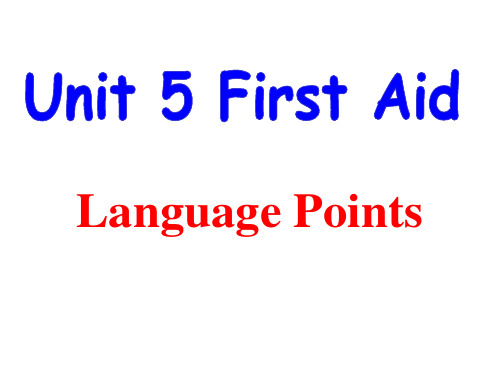
(书) applicant
application
Translate the phrases into Chinese. 1. fall ill 生病
2. get injured 负伤, 受伤 3. give first aid 进行急救 4. prevent … from 5. sense of touch 阻止, 防止, 使…不 6. get burned 触觉 7. a variety of 被烧伤/烫着
• The situation is against us. • 形势对我们不利。
正如
2. So as you can imagine, if your skin gets burned, it can be very serious.
as we/ you can see 正如我们/你们所看到的
as we all know as is known to all
The computer ___g_o_t_d_a_m__a_g_e_d__when we were moving. My cell phone _is__g_et_t_in_g__r_e_p_a_ir_e_d____now. My glasses __g_o_t_b_r_o_k_e_n____while I was playing basketball. Peter and Mary _g_o_t_m__a_r_r_ie_d__last year.
15.treat vt. & vi.治疗;对待;款待 n.款待;招待
→_______________ n.治疗;疗法;对待;待遇
16.atprpealytmvt.e_n_t_____________________________
人教版高中英语5 - 必修(英语单词表)
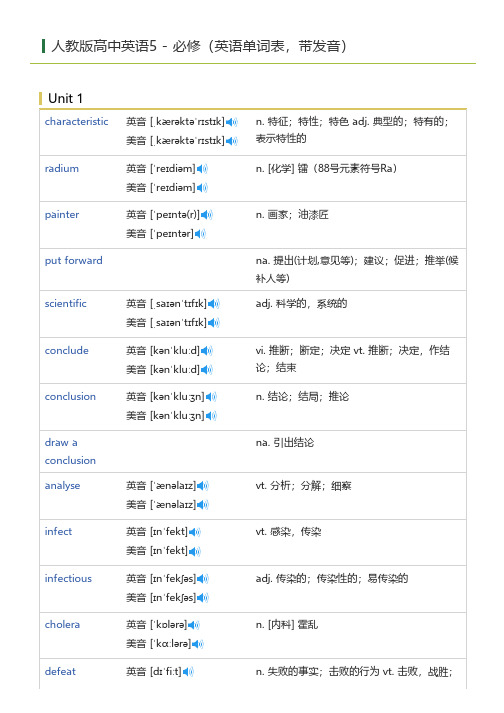
人教版高中英语5 - 必修(英语单词表,带发音)Unit 1characteristic英音 [ˌkærəktəˈrɪstɪk]美音 [ˌkærəktəˈrɪstɪk]n. 特征;特性;特色 adj. 典型的;特有的;表示特性的radium英音 [ˈreɪdiəm]美音 [ˈreɪdiəm]n. [化学] 镭(88号元素符号Ra)painter英音 [ˈpeɪntə(r)]美音 [ˈpeɪntər]n. 画家;油漆匠put forward na. 提出(计划,意见等);建议;促进;推举(候补人等)scientific英音 [ˌsaɪənˈtɪfɪk]美音 [ˌsaɪənˈtɪfɪk]adj. 科学的,系统的conclude英音 [kənˈkluːd]美音 [kənˈkluːd]vi. 推断;断定;决定 vt. 推断;决定,作结论;结束conclusion英音 [kənˈkluːʒn]美音 [kənˈkluːʒn]n. 结论;结局;推论draw aconclusionna. 引出结论analyse英音 [ˈænəlaɪz]美音 [ˈænəlaɪz]vt. 分析;分解;细察infect英音 [ɪnˈfekt]美音 [ɪnˈfekt]vt. 感染,传染infectious英音 [ɪnˈfekʃəs]美音 [ɪnˈfekʃəs]adj. 传染的;传染性的;易传染的cholera英音 [ˈkɒlər ə]美音 [ˈkɑːlərə]n. [内科] 霍乱defeat英音 [dɪˈfiːt]n. 失败的事实;击败的行为 vt. 击败,战胜;美音 [dɪˈfiːt]挫败;使失败expert英音 [ˈekspɜːt]美音 [ˈekspɜːrt]n. 专家;行家;能手 adj. 熟练的;内行的;老练的 vt. 当专家;在…中当行家attend英音 [əˈtend]美音 [əˈtend]vi. 出席;致力于;照料;照顾 vt. 出席;上(大学等);照料;招待;陪伴physician英音 [fɪˈzɪʃn]美音 [fɪˈzɪʃn]n. [医] 医师;内科医师expose英音 [ɪkˈspəʊz]美音 [ɪkˈspoʊz]vt. 揭露,揭发;使曝光;显示expose ... to un. 暴露于deadly英音 [ˈdedli]美音 [ˈdedli]adj. 致命的;非常的;死一般的 adv. 非常;如死一般地cure英音 [kjʊə(r)]美音 [kjʊr]n. 治疗;治愈;[临床] 疗法 vt. 治疗;治愈;使硫化;加工处理 vi. 治病;痊愈;受治疗;…outbreak英音 [ˈaʊtbreɪk]美音 [ˈaʊtbreɪk]n. (战争的)爆发;(疾病的)发作 vi. 爆发challenge英音 [ˈtʃælɪndʒ]美音 [ˈtʃælɪndʒ]n. 挑战;怀疑 vt. 向…挑战;对…质疑victim英音 [ˈvɪktɪm]美音 [ˈvɪktɪm]n. 受害人;牺牲品;牺牲者absorb英音 [əbˈzɔːb]美音 [əbˈzɔːrb; əbˈsɔːrb]vt. 吸收;吸引;承受;理解;使…全神贯注suspect英音 [səˈspekt]美音 [səˈspekt]n. 嫌疑犯 adj. 可疑的;不可信的 vi. 怀疑;猜想 vt. 怀疑;猜想enquiry英音 [ɪnˈkwaɪəri]美音 [ˈɪnkwəriˌɪnˈkwaɪəri]n. [计] 询问,[贸易] 询盘neighbourhood英音 [ˈneɪbəhʊd]美音 [ˈneɪbərhʊd]n. 邻近;周围;邻居关系;附近一带severe英音 [sɪˈvɪə(r)]美音 [sɪˈvɪr]adj. 严峻的;严厉的;剧烈的;苛刻的clue英音 [kluː]美音 [kluː]n. 线索;(故事等的)情节 vt. 为…提供线索;为…提供情况pump英音 [pʌmp]美音 [pʌmp]n. 泵,抽水机;打气筒 vt. 打气;用抽水机抽… vi. 抽水Cambridge英音 [ˈkeɪmbrɪdʒ]美音 [ˈkeɪmbrɪdʒ]n. 剑桥(英国城市);坎布里奇(美国马萨诸塞州城市)foresee英音 [fɔːˈsiː]美音 [fɔːrˈsiː]vt. 预见;预知investigate英音 [ɪnˈvestɪɡeɪt]美音 [ɪnˈvestɪɡeɪt]v. 调查;研究investigation英音 [ɪnˌvestɪˈɡeɪʃn]美音 [ɪnˌvestɪˈɡeɪʃn]n. 调查;调查研究blame英音 [bleɪm]美音 [bleɪm]n. 责备;责任;过失 vt. 责备;归咎于pollute英音 [pəˈluːt]美音 [pəˈluːt]vt. 污染;玷污;败坏handle英音 [ˈhænd(ə)l]美音 [ˈhændl]n. [建] 把手;柄;手感;口实 vt. 处理;操作;运用;买卖;触摸 vi. 搬运;易于操纵germ英音 [dʒɜːm]美音 [dʒɜːrm]n. [植] 胚芽,萌芽;细菌 vi. 萌芽link英音 [lɪŋk]美音 [lɪŋk]n. [计] 链环,环节;联系,关系 vt. 连接,连结;联合,结合 vi. 连接起来;联系在一起;…link ... to ...un. 同…有联系;与…有牵连announce英音 [əˈnaʊns]美音 [əˈnaʊns]vt. 宣布;述说;预示;播报 vi. 宣布参加竞选;当播音员certainty英音 [ˈsɜːt(ə)nti]美音 [ˈsɜːrtnti]n. 必然;确实;确实的事情instruct英音 [ɪnˈstrʌkt]美音 [ɪnˈstrʌkt]vt. 指导;通知;命令;教授responsible英音 [rɪˈspɒnsəb(ə)l]美音 [rɪˈspɑːnsəbl]adj. 负责的,可靠的;有责任的construct英音 [kənˈstrʌkt]美音 [kənˈstrʌkt]n. 构想,概念 vt. 建造,构造;创立construction英音 [kənˈstrʌkʃn]美音 [kənˈstrʌkʃn]n. 建设;建筑物;解释;造句contribute英音 [kənˈtrɪbjuːt]美音 [kənˈtrɪbjuːt]vt. 贡献,出力;投稿;捐献 vi. 贡献,出力;投稿;捐献 [ 过去式 contributed 过去分词…apart from prep. 除了…外(都);要不是;除了…外(还);此外firework英音 [ˈfaɪəwɜːk]美音 [ˈfaɪərwɜːrk]n. 烟火;激烈情绪chart英音 [tʃɑːt]美音 [tʃɑːrt]n. 图表;海图;图纸;排行榜 vt. 绘制…的图表;在海图上标出;详细计划;记录;记述…creative英音 [kriˈeɪtɪv]美音 [kriˈeɪtɪv]adj. 创造性的co-operative英音 [kəu'ɔpərətiv]美音 [kəu'ɔpərətiv]adj. 合作性质的;联营的positive英音 [ˈpɒzətɪv]美音 [ˈpɑːzətɪv]n. 正数;[摄] 正片 adj. 积极的;[数] 正的,[医][化学] 阳性的;确定的,肯定的;实际…strict with ...对…严格;对……严格的;对…严格要求的be strict with ...对……严格要求;对…要求严格;对某人要求严格NicolausCopernicus哥白尼;天文学家哥白尼;尼古拉斯·哥白尼revolutionary英音 [ˌrevəˈluːʃənəri]美音 [ˌrevəˈluːʃəneri]n. 革命者 adj. 革命的;旋转的;大变革的Unit 2movement 英音 [ˈmu ːvm ənt]美音 [ˈmu ːvm ənt]n. 运动;活动;运转;乐章make sense na. (话等)有意义;合理;有道理;讲得通backward英音 [ˈbækw əd]美音 [ˈbækw ərd]adj. 向后的;反向的;发展迟缓的 adv. 向后地;相反地loop英音 [lu ːp]美音 [lu ːp]vi. 打环;翻筋斗 n. 环;圈;弯曲部分;翻筋斗 vt. 使成环;以环连结;使翻筋斗privately 英音 [ˈpra ɪv ətli]美音 [ˈpra ɪv ətli]adv. 私下地;秘密地spin 英音 [sp ɪn]美音 [sp ɪn]n. 旋转;疾驰 vi. 旋转;纺纱;吐丝;晕眩 vt.使旋转;纺纱;编造;结网brightness 英音 [ˈbra ɪtn əs]美音 [ˈbra ɪtn əs]n. [光][天] 亮度;聪明,活泼;鲜艳;愉快enthusiastic 英音 [ɪn ˌθju ːzi ˈæst ɪk]美音 [ɪn ˌθu ːzi ˈæst ɪk]adj. 热情的;热心的;狂热的cautious 英音 [ˈk ɔːʃəs]美音 [ˈk ɔːʃəs]adj. 谨慎的;十分小心的reject 英音 [r ɪˈd ʒekt]美音 [r ɪˈd ʒekt]n. 被弃之物或人;次品 vt. 拒绝;排斥;抵制;丢弃universe 英音 [ˈju ːn ɪv ɜːs]美音 [ˈju ːn ɪv ɜːrs]n. 宇宙;世界;领域unite英音 [ju ˈna ɪt]美音 [ju ˈna ɪt]vi. 团结;联合;混合 vt. 使…混合;使…联合;使…团结kingdom英音 [ˈk ɪŋd əm]美音 [ˈk ɪŋd əm]n. 王国;界;领域consist英音 [k ən ˈs ɪst]美音 [k ən ˈs ɪst]vi. 由…组成;在于;符合consist of v. 由…合成LondonHeathrow无province英音 [ˈprɒvɪns]美音 [ˈprɑːvɪns]n. 省;领域;职权River Avon雅芳河;埃文河;雅芳河畔River Thames泰晤士河;伦敦泰晤士河;泰晤士河畔River Severn塞文河;塞汶河;塞文河水divide ... into v. 分为Wales英音 [weɪlz]美音 [weɪlz]n. 威尔士(英国大不列颠岛西南部地区)Scotland英音 [ˈskɒtlənd]美音 [ˈskɑːtlənd]n. 苏格兰NorthernIrelandna. 北爱尔兰clarify英音 [ˈklærəfaɪ]美音 [ˈklærəfaɪ]vt. 澄清;阐明 vi. 得到澄清;变得明晰;得到净化accomplish英音 [əˈkʌmplɪʃ]美音 [əˈkɑːmplɪʃ]vt. 完成;实现;达到unwilling英音 [ʌnˈwɪlɪŋ]美音 [ʌnˈwɪlɪŋ]adj. 不愿意的;不情愿的;勉强的break away v. 逃脱;突然离开;突然离去;挣脱break awayfromv. 脱离;离开;断绝与…的关系union英音 [ˈjuːniən]美音 [ˈjuːniən]n. 联盟,协会;工会;联合the Union Jack na. 英国国旗credit英音 [ˈkredɪt]n. 信用,信誉;[金融] 贷款;学分;信任;声美音 [ˈkredɪt]望相信信任把归给归功赞to one's credit值得赞扬;为……带来荣誉;在……名下currency英音 [ˈkʌrənsi]美音 [ˈkɜːrənsi]n. 货币;通货institution英音 [ˌɪnstɪˈtjuːʃ(ə)n]美音 [ˌɪnstɪˈtuːʃn]n. 制度;建立;(社会或宗教等)公共机构;习俗educational英音 [ˌedʒuˈkeɪʃən(ə)l]美音 [ˌedʒuˈkeɪʃənl]adj. 教育的;有教育意义的convenience英音 [kənˈviːniəns]美音 [kənˈviːniəns]n. 便利;厕所;便利的事物rough英音 [rʌf]美音 [rʌf]n. 艰苦;高低不平的地面;未经加工的材料;粗糙的部分 adj. 粗糙的;粗略的;粗野的;…roughly英音 [ˈrʌfli]美音 [ˈrʌfli]adv. 粗糙地;概略地Midlands中部地区nationwide英音 [ˌneɪʃnˈwaɪd]美音 [ˌneɪʃnˈwaɪd]adj. 全国范围的;全国性的 adv. 在全国attract英音 [əˈtrækt]美音 [əˈtrækt]vt. 吸引;引起 vi. 吸引;有吸引力historical英音 [hɪˈstɒrɪk(ə)l]美音 [hɪˈstɔːrɪkl]adj. 历史的;史学的;基于史实的architecture英音 [ˈɑːkɪtektʃə(r)]美音 [ˈɑːrkɪtektʃər]n. 建筑学;建筑风格;建筑式样;架构Roman英音 [ˈrəʊmən]美音 [ˈroʊmən]n. 罗马人;古罗马语 adj. 罗马的;罗马人的collection英音 [kəˈlekʃn]美音 [kəˈlekʃn]n. 采集,聚集;[税收] 征收;收藏品;募捐administration英音 [ədˌmɪnɪˈstreɪʃ(ə)n]n. 管理;行政;实施;行政机构美音 [ədˌmɪnɪˈstreɪʃn]port英音 [pɔːt]美音 [pɔːrt]n. 港口,口岸;(计算机的)端口;左舷;舱门 vt. 持(枪);左转舵 vi. 转向左舷Anglo-Saxon英音 [ˌæŋɡləʊˈsæksn]美音 [ˌæŋɡloʊˈsæksn]n. 盎格鲁-撒克逊Norman英音 [ˈnɔːmən]美音 [ˈnɔːrmən]adj. 诺曼第语的;诺曼第人的 n. 法国诺曼第人Viking英音 [ˈvaɪkɪŋ]美音 [ˈvaɪkɪŋ]n. 北欧海盗countryside英音 [ˈkʌntrisaɪd]美音 [ˈkʌntrisaɪd]n. 农村,乡下;乡下的全体居民enjoyable英音 [ɪnˈdʒɔɪəbl]美音 [ɪnˈdʒɔɪəbl]adj. 快乐的;有乐趣的;令人愉快的leave out na. 遗漏;忽略;〈口〉(告诉某人)停下来opportunity英音 [ˌɒpəˈtjuːnəti]美音 [ˌɑːpərˈtuːnəti]n. 时机,机会description英音 [dɪˈskrɪpʃn]美音 [dɪˈskrɪpʃn]n. 描述,描写;类型;说明书furnished英音 [ˈfɜːnɪʃt]美音 [ˈfɜːrnɪʃt]v. 供应;装备(furnish的过去分词) adj. 家具,有家具的fax 英音 [fæks]美音 [fæks]n. 传真 vt. 传真possibility英音 [ˌpɒsəˈbɪləti]美音 [ˌpɑːsəˈbɪləti]n. 可能性;可能发生的事物plus英音 [plʌs]美音 [plʌs]prep. 加,加上 n. 正号,加号;好处;附加额adj. 正的;附加的alike英音 [əˈlaɪk]美音 [əˈlaɪk]adj. 相似的;相同的 adv. 以同样的方式;类似于conflict英音 [ˈkɒnflɪkt]美音 [ˈkɑːnflɪkt]n. 冲突,矛盾;斗争;争执 vi. 冲突,抵触;争执战斗quarrel英音 [ˈkwɒrəl]美音 [ˈkwɑːrəl]n. 吵架;反目;怨言;争吵的原因;方头凿vi. 吵架;争论;挑剔take the placeofna. 接替某人的位置break down v. 分解;抛锚;分析;划分arrange英音 [əˈreɪndʒ]美音 [əˈreɪndʒ]vi. 安排;排列;协商 vt. 安排;排列;整理wedding英音 [ˈwedɪŋ]美音 [ˈwedɪŋ]n. 婚礼,婚宴;结婚;结合 v. 与…结婚(wed 的ing形式)fold英音 [fəʊld]美音 [foʊld]n. 折痕;信徒;羊栏 vt. 折叠;合拢;抱住;笼罩 vi. 折叠起来;彻底失败sightseeing英音 [ˈsaɪtsiːɪŋ]美音 [ˈsaɪtsiːɪŋ]n. 观光;游览 v. 观光(sightsee的ing形式);游览 adj. 观光的;游览的delight英音 [dɪˈlaɪt]美音 [dɪˈlaɪt]n. 高兴 vt. 使高兴 vi. 高兴royal英音 [ˈrɔɪəl]美音 [ˈrɔɪəl]n. 王室;王室成员 adj. 皇家的;盛大的;女王的;高贵的;第一流的uniform英音 [ˈjuːnɪfɔːm]美音 [ˈjuːnɪfɔːrm]n. 制服 adj. 统一的;一致的;相同的;均衡的;始终如一的 vt. 使穿制服;使成一样St Paul's Cathedral 圣保罗大教堂;伦敦圣保罗大教堂;圣保罗教堂splendid英音 [ˈsplendɪd]美音 [ˈsplendɪd]adj. 辉煌的;灿烂的;极好的;杰出的WestminsterAbbeyn. 【旅】西敏寺;【旅】威斯敏斯特大教堂statue英音 [ˈstætʃuː]美音 [ˈstætʃuː]n. 雕像,塑像 vt. 以雕像装饰Unit 3Buckingham Palace 英音 [ˌb ʌk ɪŋəm ˈpæl əs]美音 [ˌb ʌk ɪŋəm ˈpæl əs]n. 【旅】白金汉宫Greenwichn. 格林威治(英国伦敦东南一市镇, 从前皇家天文台的所在地; 通过该天文台的经线被…longitude 英音 [ˈl ɒŋɡɪtju ːd]美音 [ˈlɑːnd ʒɪtu ːd]n. [地理] 经度;经线imaginary 英音 [ɪˈmæd ʒɪn əri]美音 [ɪˈmæd ʒɪneri]adj. 虚构的,假想的;想像的;虚数的navigation 英音 [ˌnæv ɪˈɡe ɪʃn]美音 [ˌnæv ɪˈɡe ɪʃn]n. 航行;航海Highgate Cemetery 海格特公墓;海格尔公墓;海格特墓地communism英音 [ˈk ɒmj ən ɪz əm]美音 [ˈkɑːmj ən ɪz əm]n. 共产主义original英音 [əˈr ɪd ʒən(ə)l]美音 [əˈr ɪd ʒənl]n. 原件;原作;原物;原型 adj. 原始的;最初的;独创的;新颖的thrill英音 [θr ɪl]美音 [θr ɪl]n. 激动;震颤;紧张 vt. 使…颤动;使…紧张;使…感到兴奋或激动 vi. 颤抖;感到兴奋…pot 英音 [p ɒt]美音 [pɑːt]n. 壶;盆;罐 vt. 把…装罐;射击;节略 vi. 随手射击error 英音 [ˈer ə(r)]美音 [ˈer ər]n. 误差;错误;过失tense 英音 [tens]美音 [tens]n. 时态 adj. 紧张的;拉紧的 vt. 变得紧张;使拉紧 vi. 拉紧,变得紧张consistent 英音 [k ən ˈs ɪst ənt]美音 [k ən ˈs ɪst ənt]adj. 始终如一的,一致的;坚持的aspect英音 [ˈæspekt]n. 方面;方向;形势;外貌impression英音 [ɪmˈpreʃ(ə)n]美音 [ɪmˈpreʃn]n. 印象;效果,影响;压痕,印记;感想;曝光(衡量广告被显示的次数。
高中英语人教新课标必修五unit5-单词讲解
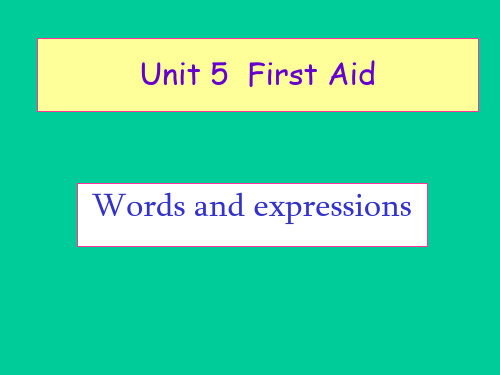
pour (使液体)倾倒,倒出(+ prep./ adv.);倒,斟 (饮料)
I poured too much sauce over the noodle. pour a coffee/ tea for sb The instant I finished reading the letter, tears
It’s commonly admitted that positive attitude is vital to study.
• Needless to say, it’s vital that we _s_h_o_u_ld__g_i_v_e_e_f_fe_c_t_iv_e__fi_r_s_t _a_id__ (对伤者实施 有效的急救) to a victim in time.
In place 在适当的位置, 适当 out of place 不在适当的位置, 不适当 in place of 代替 take the place of 代替
She likes everything __t_o__b_e_i_n_p_l_a_c_e__ before
she starts work.
nerve n. 神经, 勇气;魄力;胆量 a man of nerve 勇敢的人,有勇气的人 (pl) 神经质;神经过敏 She gets nerves before every examination. 每次考试前她都很紧张。
Get on sb’s nerves刺激或烦扰某人 Stop whistling! It’s/You’re getting on my nerves.
choke one’s feelings 抑制感情
eg.The smoke almost choked me.烟呛得我几乎喘不出气
高中英语人教版必修五词汇表

1.character istic特征;特性n. 特有的,特色的adj. character n.性格,品质;特性;角色;2. radium镭n.3.painter画家n.4.put forward提出;提前=come up with (a question/plan/proposal..)5.scien tific科学的adj. scien ce n. 科学6.conclu de结束;推断出vt.&vi.conclu sion结论;结束n.draw/reach/come to a conclusion 得出结论9. analys e分析vt.→analys is n. 分析bas e (n./v.) 基础;以…为基础→bas is基础n.10.infect传染;感染vt.→infect ious传染的adj.12.cholera霍乱n.13.defeat打败;受挫;使战胜vt.失败n.14.expert=specialist 专家;行家n.=experienced熟练的;经验或知识丰富的adj.be expert in在....方面是内行的15.attend照顾;护理;出席;参加vt.=(look after/take care of)16.physic ian医生;内科医师n.类似的还有music-musician17.expose暴露;揭露;使曝光vt.expose…to使显露;暴露vt.→expo sure n.暴露,曝光19.deadly致命的adj.20.cure治愈;痊愈n.治愈;治疗vt.cure sb of sth 某人治愈了(疾病…)21.outbreak爆发;发作n.(区分短语break out)22.challenge挑战n.向……挑战vt.23.victim受害者n.24. absorb吸收;吸引;使专心vt.sb be absorb ed/buried in 专注于,沉迷于25.suspect怀疑vt.被怀疑者;嫌疑犯n.26.enquir y询问n. enquir e v.27.neighbor hood附近;邻近n.28.severe严重的;剧烈的;严厉的adj.29.clue线索;提示n.30.pump泵;抽水机n.(用泵)抽(水)vt.31.Cambridge street剑桥大街32.forese-forsaw-forseen 遇见,预知vt.33.investigat e调查vt.&vi.=look into investigat ion调查n.35.blame责备;谴责vt.过失;责备n.△Sb/sth be to blame (for doing)应当被责备△take the blame for sth 为…承担责任△blame sth on sb = lay the blame on sb for sth 因某事而责怪某人,把某事归咎于某人36.pollut e污染;弄脏vt. pollut ion n.37.handle柄;把手n.处理;操纵vt.38.germ微生物;细菌n.39.link连接;联系n.40.link...to...将……和……联系或连接起来41.announce宣布;通告vt.→announce ment宣布;通告n. make an ~作出声明42.certain ty确信;确实n. with certain 肯定地certain adj. 确信的→certain ly确实是adv.43.instruct命令;指示;教导vt.instruction 命令;指示;教导n.44.responsib le有责任的;负责的adj.responsib ility责任n.45.construct建设;修建vt.construct ion建设;建筑物n.47.contribute捐献;贡献;捐助vt.&vi.contribu tion捐献;贡献;捐助n.make a contribution/contriutions to 有利于,促进48.apart from除……之外;此外49.firework烟火(燃放)n.50.chart图表n.51.creative有创造力的;创造性的;独创的adj.creat e(v.)创造→creat ive(adj.)→creat ivity(n.)创造力act(v.)行动→act ive(adj.)活跃的→act ivity(n.)活动52.co-operative合作的adj. co-前缀共同的operate v.53.positive积极的;肯定的;确实的adj.54.be strict with...对……严格的55.Nicolaus Copernicus尼古拉.哥白尼(波兰天文学家)56.revolution ary革命的;重大变革的adj.57.move ment移动;运动;动作n.58.make sense讲得通;有意义59.back ward向后的(地);相反的(地);退步的(地)adj.&adv.60.loop圈;环n.61.private ly私下地;秘密地adv. priva cy n.隐私62.spin(spun,spun)(使)旋转;纺(线或纱)vt.&vi.63.bright ness明亮;亮度;聪颖n.64.enthusia stic热情的;热心的adj.enthusias m n. 热情65.cau tious小心的;谨慎的adj. cau tion n.谨慎66.reject拒绝;不接受;抛弃vt.67.univer se宇宙;世界n. univer sial adj.普遍的John S now defeats “king cholera”John Snow was a famous doctor in london-so expert, indeed,that he attended queen victora as her personal physician. But he became inspired when he thought about helping ordinary people (exposed to cholera). This was the deadly disease of its day. Neither its cause nor its cure was understood.so many thousands of terrified people died every time there was an outbreak. John snow wanted to face the challenge and solve this problem. He knew that cholera would never be controlled until its cause was found.约翰雪是伦敦的一位非常著名的医生,确实,他作为维多利亚女王的私人医生来照顾她,但是当他想到帮助暴露在霍乱王疾病下的普通人时,他变的很有灵感,在那时,这是一个致命的疾病,不论他的感染方式还是治愈方法都无从知晓,所以每次爆发的时候都有数以千计的惊恐的人丧生.约翰学想要面对这个挑战并且解决这个问题,他知道霍乱的起源如果无法找到,他将无法控制.He became insterested in two theories that poissibly explained how cholera killed people. The first suggested that cholera multiplied in the air. A cloud of dangerous gas floated around until it found its victim. The second suggested that people absorbed this disease into their boddies with their meals. From the stomach the diseasequickly attacked the body and soon the affected person died.他变的对可能解释霍乱如何杀人的两个学说感兴趣起来,第一个说明霍乱在空气中繁殖,一团危险的气体漂浮着直到找到他的感染者,第二个表明人们在吃饭时把疾病吸收入身体,这病毒从胃里很快的攻击身体并且很快导致感染者死亡.John snow suspected that the second theory was correct but he needed evidence. So when another outbreak hit London in 1854, he was ready to begin his enquire. As the disease quickly spread through poor neighbourhoods, he began to gather information. In two particular streets, the cholera outbreak was so severe that more than 500 people died in ten days. He was determined to find out why.约翰雪怀疑第二个学说是正确的但他需要证据,所以当其他的霍乱在1854年的伦敦爆发时,他已经完成了他询问的准备工作,当这个疾病很快传播到穷邻居时,他开始去收集信息,在两个特别的街道,霍乱的爆发特别严重以致于有五百多人在十天内死亡,他下定了找出原因的决心.First he marked on a map the exact places where all the deadpeople had lived. This gave him a valuable clue about the cause of the disease. Many of the deaths were near the water pump in Broad Street. He also noticed that some houses had had no death. He had not foreseen this, so he made further investigations, he discovered that these people worked in the pub at 7 Cambridge street. They had been given free beer and so had not drunk the water from the punp. It seemed that the water was to blame.首先他在地图上标出了死去的人曾经居住过的确切地点,这给了他一个有价值的关于疾病起源的线索,在宽街上,多死去的人的居住地邻近水泵.他也注意到了一些房子没有人死去,他没有对此深究,所以,他作了一个进一步的调查,他发现这些人们工作在剑桥七街的酒吧里,他们被给予了免费的啤酒所以不需要去喝水泵里的水,看起来,应该责备的是水.Next, John snow look into the source of the water for these two streets. He found that it came from the river (polluted by the dirty water from London). He immediately told the astonished people in Broad Btreet to remove the handle from the pump so that it could not be used. Soon afterwords the disease slowed down. He had shown that cholera was spread by germs and not in a cloud of gas.接下来,约翰雪调查这两条街的水的起源,他发现这水来自被伦敦来的污水污染过的河流,他立刻告诉宽街上惊恐的人们移开水泵的把手从而使他不能被使用,在这之后,很快这疾病就减缓了,他展示了霍乱是通过细菌来传播而不是一团气体.In another part of London, he found supporting evidence from two other deaths that were linked to the broad street outbreak. A woman, who had moved away from Broad Street, liked the water from the pump so much that she had it delivered to her house everyday. Both she and her daughter died of cholera after drinkingthe water. With this extra evidence john snow was able to announce with certainty that polluted water carried the virus.在伦敦的其他部分,他发现其他两个与宽街爆发有关的死亡病例来作为支持证据,一个从宽街搬走的女子,非常喜欢从那个水泵里打出的水,以致于每天她都让那水送到她家供他饮用,在喝过水后,她和她的女儿都死去了,用这个额外的证据,约翰雪有能力确定地宣布是被污染的水带来了病毒.To prevent this from happening again, JohnSnow suggested that the source of all the water supplies be examined. The water companies were instructed not expose people to polluted water any more.F inally “king cholera”was defeated.为了阻止霍乱的再次发生,约翰雪建议所有的供水源头都应该被检查,卖水公司被命令不许再把人们暴露在污染的水之下,最终,”霍乱王”被击败了.第二单元单词:1.unite联合;团结vi.&vt. united adj.2king dom王国n.3consist组成;在于;一致vi.4consist of由……组成5London Heathrow Airport伦敦希尔罗机场6province省;行政区n.7River Avon埃文河8River Thames泰晤士河9River Severn塞文河10divide... into把……分成11Wales威尔士(英)12Scotland苏格兰(英)13Northern北爱尔兰(英)14 clar ify澄清;阐明vt.15 accomplish完成;达到;实现vt. = achieve accomplish ment = achieve ment n.16 conflict矛盾;冲突n.17un will ing不愿意(的);不乐意(的)adj.18break away(from)挣脱(束缚);脱离19union联合;联盟;结合;协会n.20the Union Jack英国国旗21credit信任;学分;赞扬;信贷n.Un credit able 不可置信的22to one's credit为……带来荣誉;值得赞扬;在……名下23curren cy货币;通货n.curren t adj. 现在的;水流n.24institution制度;机制;公共机构n.25 education al教育的adj.26 convenien ce便利;方便n.convenien t adj. 便利的in convenien t adj.不便利的27rough粗糙的;粗暴的adj.28rough ly粗略地;粗糙地adv.29Midlands英格兰中部地区30 nationwide全国性的;全国范围的adj.31attract吸引;引起注意vt.–ive adj. –ion n.32histor ical历史(上)的;有关历史的adj. 33architecture建筑学;建筑艺术n.34Roman(古)罗马人n.(古)罗马的adj.35 collection收藏品;珍藏;收集n.36 administration管理;行政部门n.37 port港口(城市)n.38 Anglo-Saxon盎格鲁—撒克逊人n.盎格鲁—撒克逊人的adj.39 Norman诺曼人;诺曼语n.诺曼的;诺曼人(语)的adj.40Viking北欧海盗;斯堪的纳维亚人n.41countryside乡下;农村n.42enjoy able令人愉快的;使人高兴的adj.43leave out省去;遗漏;不考虑44opportunity机会;时机n.45descri ption描写;描述n. descri be v. 描述46furnish ed配备好装备的;带家具的adj.47fax传真(机)n.用传真传输(文件)vt.48possibility可能(性)n.49plus加上;和perp.加的;正的;零上的adj.50quarrel争吵;争论;吵架n.争吵;吵架vi.51alike相同的;类似的adj.52 take the place of代替=replace=take one’s place53 break down(机器)损坏;破坏54 arrange筹备;安排;整理vt. arrange ment n. 55wedding婚礼n.56 fold折叠;对折vt. unfold vt. 打开57sightseeing观光;游览n.58delight快乐;高兴;喜悦n.使高兴;使欣喜vt.Delight ful adj. 令人愉悦的(修饰物)Delight ed adj. 开心的(修饰人) delighted ly adv.59royal王室的;皇家的;高贵的adj.60uni form制服n. uni-表示”one”61 St Paul's Cathedral圣保罗大教堂62 splendid壮丽的;辉煌的;极好的adj.63 Westminster Abbey威斯敏斯特大教堂(英国名人墓地)64 statue塑像;雕像n.65Buckingham palace白金汉宫66Greenwich格林尼治(英城市)n.67longitude经线;经度n.68 imagin ary想象中的;假象的;虚构的adj. Imagin e v. 想象69 navigation导航;航行n.70 Highgate Cemetery海格特墓地(英伦敦北郊,内有马克思及其家人的坟墓)71commun ism共产主义n.72 origin al最初的;原始的;独创的;新颖的adj.73thrill 使激动;使胆战心惊vt.thrill er惊悚片n.74 pot罐;壶n.75 error错误;过失;谬误n.76 tense时态n. adj. 紧张的77 consist ent一致的adj. consisten cy n.The United KingdomPeople may wonder why different words are used to describe these four countries: England, Wales, Scotland and Northern Ireland. You can clarify this question if you study British history.First there was England. Wales was linked to it in the thirteenth century. Now when people refer to England you find Wales included as well. Next England and Wales were joined to Scotland in the seventeenth century and the name was changed to "Great Britain". Happily this was accomplished without conflict when King James of Scotland became King of England and Wales as well. Finally the English government tried in the early twentieth century to form the United Kingdom by getting Ireland connected in the same peaceful way. However, the southern part of Ireland was unwilling and broke away to form its own government. So only Northern Ireland joined with England, Wales and Scotland to become the United Kingdom and this was shown to the world in a new flag called the Union Jack.To their credit the four countries do work together in some areas (eg, the currency and international relations), but they still have very different institutions. For example, Northern Ireland, England and Scotland have different educational and legal systems as well as different football teams for competitions like the World Cup!England is the largest of the four countries, and for convenience it is divided roughly into three zones. The zone nearest France is called the South of England, the middle zone is called the Midlands and the one nearest to Scotland is known as the North. You find most of the population settled in the south, but most of the industrial cities in the Midlands and the North of England. Although, nationwide, these cities are not as large as those in China, they have world-famous football teams and some of them even have two! It is a pity that the industrial cities built in the nineteenth century do not attract visitors. For historical architecture you have to go to older but smaller towns built by the Romans. There you will find out more about British history and culture.The greatest historical treasure of all is London with its museums, art collections, theatres, parks and buildings. It is the centre of national government and its administration. It has the oldest port built by the Romans in the first century AD, the oldest building begunby the Anglo-Saxons in the 1060s and the oldest castle constructed by later Norman rulers in 1066. There has been four sets of invaders of England. The first invaders, the Romans, left their towns and roads. The second, the Anglo-Saxons, left their language and their government. The third, the Vikings, influenced the vocabulary and place-names of the North of England, and the fourth, the Normans, left castles and introduced new words for food.If you look around the British countryside you will find evidence of all these invaders. You must keep your eyes open if you are going to make your trip to the United Kingdom enjoyable and worthwhile.课文翻译人们也许想知道为什么不同的词汇被用来描述这四个国家:英格兰、威尔士、苏格兰和北爱尔兰。
人教版 高中英语必修5 课本单词表
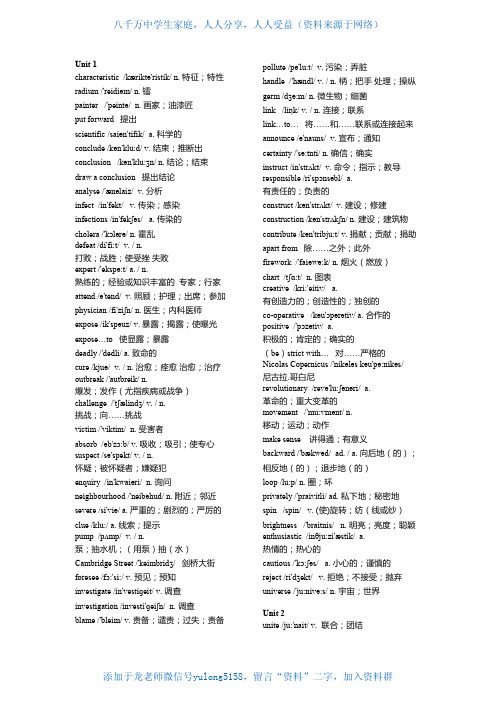
Unit 1characteristic /kæriktə'ristik/ n. 特征;特性radium /'reidiəm/ n. 镭painter /'peintə/ n. 画家;油漆匠put forward 提出scientific /saiən'tifik/ a. 科学的conclude /kən'klu:d/ v. 结束;推断出conclusion /kən'klu:ʒn/ n. 结论;结束draw a conclusion 提出结论analyse /'ænəlaiz/ v. 分析infect /in'fekt/ v. 传染;感染infections /in'fekʃəs/ a. 传染的cholera /'kɔlərə/ n. 霍乱defeat /di'fi:t/ v. / n.打败;战胜;使受挫失败expert /'ekspə:t/ a. / n.熟练的;经验或知识丰富的专家;行家attend /ə'tend/ v. 照顾;护理;出席;参加physician /fi'ziʃn/ n. 医生;内科医师expose /ik'spəuz/ v. 暴露;揭露;使曝光expose…to 使显露;暴露deadly /'dedli/ a. 致命的cure /kjuə/ v. / n. 治愈;痊愈治愈;治疗outbreak /'autbreik/ n.爆发;发作(尤指疾病或战争)challenge /'tʃælindʒ/ v. / n.挑战;向……挑战victim /'viktim/ n. 受害者absorb /əb'zɔ:b/ v. 吸收;吸引;使专心suspect /sə'spekt/ v. / n.怀疑;被怀疑者;嫌疑犯enquiry /in'kwaiəri/ n. 询问neighbourhood /'neibəhud/ n. 附近;邻近severe /si'viə/ a. 严重的;剧烈的;严厉的clue /klu:/ a. 线索;提示pump /pʌmp/ v. / n.泵;抽水机;(用泵)抽(水)Cambridge Street /'keimbridʒ/ 剑桥大街foresee /fɔ:'si:/ v. 预见;预知investigate /in'vestiɡeit/ v. 调查investigation /investi'ɡeiʃn/ n. 调查blame /'bleim/ v. 责备;谴责;过失;责备pollute /pə'lu:t/ v. 污染;弄脏handle /'hændl/ v. / n. 柄;把手处理;操纵germ /dʒə:m/ n. 微生物;细菌link /liŋk/ v. / n. 连接;联系link…to… 将……和……联系或连接起来announce /ə'nauns/ v. 宣布;通知certainty /'sə:tnti/ n. 确信;确实instruct /in'strʌkt/ v. 命令;指示;教导responsible /ri'spɔnsəbl/ a.有责任的;负责的construct /kən'strʌkt/ v. 建设;修建construction /kən'strʌkʃn/ n. 建设;建筑物contribute /kən'tribju:t/ v. 捐献;贡献;捐助apart from 除……之外;此外firework /'faiəwə:k/ n. 烟火(燃放)chart /tʃɑ:t/ n. 图表creative /kri:'eitiv/ a.有创造力的;创造性的;独创的co-operative /kəu'ɔpərətiv/ a. 合作的positive /'pɔzətiv/ a.积极的;肯定的;确实的(be)strict with… 对……严格的Nicolas Copernicus /'nikələs kəu'pə:nikəs/ 尼古拉.哥白尼revolutionary /revə'lu:ʃənəri/ a.革命的;重大变革的movement /'mu:vmənt/ n.移动;运动;动作make sense 讲得通;有意义backward /'bækwəd/ ad. / a. 向后地(的);相反地(的);退步地(的)loop /lu:p/ n. 圈;环privately /'praivitli/ ad. 私下地;秘密地spin /spin/ v. (使)旋转;纺(线或纱)brightness /'braitnis/ n. 明亮;亮度;聪颖enthusiastic /inθju:zi'æstik/ a.热情的;热心的cautious /'kɔ:ʃəs/ a. 小心的;谨慎的reject /ri'dʒekt/ v. 拒绝;不接受;抛弃universe /'ju:nivə:s/ n. 宇宙;世界Unit 2unite /ju:'nait/ v. 联合;团结kingdom /'kiŋdəm/ n. 王国consist /kən'sist/ v. 组成;在于;一致consist of 由……组成London Heathrow Airport /'hi:θrəu/伦敦希思罗机场province /'prɔvins/ n. 省;行政区River Avon /'eivɔn/ 埃文河River Thames /'temz/ 泰晤士河River Severn /'sevən/ 塞文河divide…into 把……分成Wales /weilz/ 威尔士Scotland /'skɔtlənd/ 苏格兰Northern Ireland /'aiələnd/ 北爱尔兰clarify /'klærifai/ v. 澄清;阐明accomplish /ə'kʌmpliʃ/ v. 完成;达到;实现conflict /'kɔnflikt/ n. 矛盾;冲突unwilling /ʌn'wiliŋ/ a.不愿意(的);不乐意(的)break away (from) 挣脱(束缚);脱离union /'ju:niən/ n. 联合;联盟;结合;协会the Union Jack 英国国旗credit /'kredit/ n. 信任;学分;赞扬;信贷to one’s credit为……带来荣誉;值得赞扬;在……名下currency /'kʌrənsi/ n. 货币;通货institution /insti'tju:ʃn/ n.制度;机制;公共机构educational /edju:'keiʃənl/ a. 教育的convenience /kən'vi:niəns/ n. 便利;方便rough /rʌf/ a. 粗糙的;粗暴的roughly /'rʌfli/ ad. 粗略地;粗糙地Midlands /'midləndz/ 英格兰中部地区(英)nationwide /neiʃən'waid/ a.全国性的;全国范围的attract /ə'trækt/ v. 吸引;引起注意historical /his'tɔrikəl/ a.历史(上)的;有关历史的architecture /'ɑ:kitektʃə/ n.建筑学;建筑艺术Roman /'rəumən/ n. /adj.(古)罗马人 ;(古)罗马的collection /kə'lekʃn/ n. 收藏品;珍藏;收集administration /ədminis'treiʃn/ n.管理;行政部门port /pɔ:t/ n. 港口(城市)Anglo-Saxon /æŋɡləu 'sæksn/ n.盎格鲁-撒克逊人Norman /'nɔ:mən/ n.诺曼人;诺曼语诺曼的;诺曼人(语)的Viking /'vaikiŋ/ n. 北欧海盗countryside /'kʌntrisaid/ n. 乡下;农村enjoyable /in'dʒɔiəbl/ a.令人愉快的;使人高兴的leave out 省去;遗漏;不考虑opportunity /ɔpə'tju:nəti/ n. 机会;时机description /di'skripʃn/ n. 描写;描述furnished /'fə:niʃt/ a.配备好装备的;带家具的fax /fæks/ n. / v.传真(机);用传真传输(文件)possibility /pɔsə'biləti/ n. 可能(性)plus /plʌs/ prep. / a.加上;和加的;正的;零上的quarrel /'kwɔrəl/ n. / v.争吵;争论;吵架争吵;吵架alike /ə'laik/ a. 相同的;类似的take the place of 代替break down (机器)损坏;破坏arrange /ə'reindʒ/ v. 筹备;安排;整理wedding /'wediŋ/ n. 婚礼fold /fəuld/ v. 折叠;对折sightseeing /sait'si:iŋ/ n. 观光;游览delight /di'lait/ n. / v.快乐;高兴;喜悦使高兴;使欣喜royal /'rɔiəl/ a. 王室的;皇家的;高贵的uniform /'ju:nifɔ:m/ n. 制服St Paul's Cathedral /sənt pɔ:lz kə'θi:drəl/ 圣保罗大教堂splendid /'splendid/ a.壮丽的;辉煌的;极好的Westminster Abbey /'westminstə 'æbi/威斯敏斯特教堂statue /'stætʃu:/ n. 塑像;雕像Buckingham Palace /'bʌkiŋəm/ 白金汉宫Greenwich /'ɡrenidʒ/ 格林尼治longitude /'lɔndʒitju:d/ n. 经线;经度imaginary /i'mædʒinəri/ a.想象中的;假想的;虚构的navigation /nævi'ɡeiʃn/ n. 导航;航行High gate Cemetery /'haiɡeit 'semətri/ 海格特墓地(英伦敦北郊,内有马克思及其家人的坟墓communism /'kɔmjunizəm/ n. 共产主义original /ə'ridʒənəl/ a.最初的;原始的;独创的;新颖的thrill /θril/ v. 使激动;使胆战心惊pot /pɔt/ n. 罐;壶error /'erə/ n. 错误;过失;谬误tense /tens/ n. 时态consistent /kən'sistənt/ a. 一致的Unit 3aspect /'æspekt/ n. 方面;层面impression /im'preʃn/ n. 印象;感想;印记take up 拿起;接受;开始;继续constant /'kɔnstənt/ a.时常发生的;连续不断的constantly /'kɔnstəntli/ ad. 不断地jet /dʒet/ n. 喷气式飞机jet lag 飞行时差反应flashback /'flæʃbæk/ n. 闪回;倒叙previous /'pri:viəs/ a. 在前的;早先的uncertain /'pri:viəs/ a. 不确切的;无把握的guide /ɡaid/ n. / v.指导;向导;导游指引;指导tablet /'tæblit/ n. 药片expertise /ekspə:'ti:z/ n.专家意见;专门知识(技能等)capsule /'kæpsju:l/ n. 太空舱;胶囊steward /'stju:əd/ n. 乘务员;服务员stewardess /stjuə'des/ n. 女乘务员opening /'əupniŋ/ n.(出入的)通路;开口;开端sideways /'saidweiz/ ad.往(向、从)一侧;侧着;侧面朝前surrounding /sə'raundiŋz/ n.周围的事物;环境tolerate /'tɔləreit/ v. 容忍;忍受combination /kɔmbi'neiʃn/ n. 结合;组合lack /læk/ v. / n.缺乏;没有缺乏;短缺的东西adjustment /ə'dʒʌstmənt/ n. 调整;调节mask /mɑ:sk/ n. 面具;面罩;伪装be back on one’s feet(困境后)恢复;完全复原hover /'hɔvə/ v. 盘旋carriage /'hɔvə/ n.运输工具;四轮马车;客车press /pres/ v. / n.按;压;逼迫按;压;印刷;新闻fasten /'fɑ:sn/ v. 系牢;扎牢belt /belt/ n. 腰带;皮带safety belt 安全带lose sight of…看不见……sweep up 打扫;横扫flash /flæʃ/ v. (使)闪光;(使)闪现switch /switʃ/ v. / n. 开关;转换转换timetable /'taimteibl/ n. 时间表;时刻表exhausted /iɡ'zɔ:stid/ a.筋疲力尽的;疲惫不堪的slide into(快捷而悄声地)移动;溜进……optimistic /ɔpti'mistik/ a. 乐观(主义)的pessimistic /pesi'mistik/ a. 悲观(主义)的speed up 加速pedal /'pedl/ n. 踏板;脚蹬alien /'eiliən/ n. / a. 外星人;外国人陌生的;外国的;外星球的mud /mʌd/ n. 泥(浆)desert /'dezət/ n. 沙漠;荒原enormous /i'nɔ:məs/ a. 巨大的;庞大的imitate /'imiteit/ v. 模仿;仿造moveable /'mu:vəbl/ a. 可移动的;活动的citizen /'sitizn/ n. 公民;居民;市民typist /'taipist/ n. 打字员typewriter /'taipraitə/ n. 打字机postage /'pəustidʒ/ n. 邮资postcode /'pəustkəud/ n. 邮政编码button /'bʌtn/ n. 钮锃;按钮instant /'instənt/ n. / a.瞬间;片刻立即的;立刻的receiver /ri'si:və/ n.接受者;接收器;电话听筒efficiency /i'fiʃnsi/ n. 效率;功效efficient /i'fiʃnt/ a. 效率高的;有能力的ribbon /'ribən/ n. 丝带;带状物dustbin /'dʌstbin/ n. 垃圾箱dispose /di'spəuz/ v. 布置;安排disposal /di'spəuzl/ n. 清除;处理ecology /i'kɔlədʒi/ n. 生态;生态学greedy /ɡri:di/ a. 贪吃的;贪婪的;贪心的swallow /'swɔləu/ v. 吞下;咽下material /mə'tiəriəl/ n. 原料;材料recycle /ri:'saikl/ v. 回收利用;再利用manufacture /mænju'fæktʃə/ v.(用机器)大量生产;成批制造goods /ɡudz/ n. 货物etc /it'setərə/ abbr. 诸如此类;等等representative /repri'zentətiv/ n. / a. 代表;典型人物典型的;有代表性的settlement /'setlmənt/ n. 定居;解决motivation /məuti'veiʃn/ n. 动机Unit 4journalist /'dʒə:nəlist/ n. 记者;新闻工作者involve /in'vɔlv/ v.牵涉;涉及;包括;使参与(卷入)…editor /'editə/ n. 编辑photograph /'fəutəɡrɑ:f/ n. / v.照片;给……照相photographer /fə'tɔɡrəfə/ n. 摄影师photography /fə'tɔɡrəfi/ n. 摄影unforgettable /ʌnfə'ɡetəbl/ a.难忘的;永远记得的assignment /ə'sainmənt/ n. 任务;分配delighted /di'laitid/ a. 快乐的;欣喜的admirable /'ædmərəbl/ a.值得赞扬的;令人钦佩的unusual /ʌn'ju:ʒuəl/ a. 不同寻常的;独特的assist /ə'sist/ v. 帮助;协助;援助assistant /ə'sistənt/ n. 助手;助理;售货员submit /səb'mit/ v. 递交;呈递(文件等)profession /prəu'feʃn/ n. 职业;专业professional /prə'feʃənəl/ a. / n.专业的;职业的专业人员colleague /'kɔli:ɡ/ n. 同事eager /'i:ɡə/ a. 渴望的;热切的concentrate /'kɔnsəntreit/ v. 集中;聚集concentrate on 集中;全神贯注于amateur /'æmətə/ n. 业余爱好者update /ʌp'deit/ v. 更新;使现代化acquire /ə'kwaiə/ v. 获得;取得;学到assess /ə'ses/ v. 评估;评定inform /in'fɔ:m/ v. 告知;通知deadline /'dedlain/ n. 最后期限interviewee /intəvju:'i:/ n.参加面试者;接受采访者meanwhile /'mi:nwail/ ad. 其间;同时depend on 依靠;依赖case /keis/ n. 情况;病例;案例accuse /ə'kju:z/ v. 指责;谴责;控告accuse…of 因……指责或控告……accusation /ækju:'zeiʃn/ n. 指责;谴责;控告deliberately /di'libərətli/ ad. 故意地so as to (do sth) 为了(做)……deny /di'nai/ v. 否认;拒绝sceptical /'skeptikl/ a. 怀疑的(<美>skeptical)guilty /'ɡilti/ a. 犯罪的;有罪的;内疚的dilemma /di'lemə/ n.(进退两难的)困境;窘境demand /di'mɑ:nd/ n. / v.需求;要求;强烈要求demanding /di'mɑ:ndiŋ/ a.要求很高的;费力的publish /'pʌbliʃ/ v. 出版;发行;发表;公布scoop /sku:p/ n.抢先获得的新闻、利润等;勺子;铲子section /'sekʃn/ n. 部分;节concise /kən'sais/ a. 简明的;简练的imaginative /i'mædʒinətiv/ a. 富于想象力的technical /'teknikl/ a.技术(上)的;技巧方面的technically /'teknikli/ ad. 技术上;工艺上thorough /'θʌrə/ a. 彻底的;详尽的gifted /'ɡiftid/ a. 有天赋的idiomatic /idiə'mætik/ a.惯用的;合乎语言习惯的housewife /'hauswaif/ n. 家庭主妇crime /kraim/ n. 罪行;犯罪edition /i'diʃn/ n. 版(本);版次ahead of 在……前面department /di'pɑ:tmənt/ n.部门;部;处;系accurate /'ækjurət/ a. 精确的;正确的senior /'si:niə/ a.年长的;高年级的;高级的polish /'pɔliʃ/ v. 擦亮;磨光;润色chief /tʃi:f/ a. / n.主要的;首席的首领;长官approve /ə'pru:v/ v. 赞成;认可;批准process /'prəuses/ n. / v.加工;处理过程;程序;步骤negative /'neɡətiv/ n. / a.底片;否定否定的;消极的appointment /ə'pɔintmənt/ n. 约会;任命Unit 5aid /eid/ n. / v. 帮助;援助;资助first aid (对伤患者的)急救temporary /'tempərəri/ a. 暂时的;临时的fall ill 生病injury /'indʒəri/ n. 损伤;伤害bleed /bli:d/ v. (bled,bled)流血nosebleed /'nəuzbli:d/ n. 鼻出血;流鼻血sprain /'nəuzbli:d/ v. 扭伤sprained /spreind/ a. 扭伤的ankle /'æŋkl/ n. 踝(关节)choke /tʃəuk/ v. (使)噎住;(使)窒息cupboard /'kʌbəd/ n. 橱柜;衣柜skin /skin/ n. 皮;皮肤essential /i'senʃl/ a.最重要的;不可缺少的;本质的organ /'ɔ:ɡən/ n. 器官layer /'leiə/ n. 层;层次barrier /'bæriə/ n. 屏障;障碍(物)poison /'pɔizn/ n. / v.毒药;毒害毒害;使中毒ray /rei/ n. 光线;射线complex /'kɔmpleks/ a. 复杂的variety /və'raiəti/ n.变化;多样(化);多变(性)liquid /'likwid/ n. 液体radiation /reidi'eiʃn/ n. 辐射;射线mild /maild/ a. 轻微的;温和的;温柔的mildly /'maildli/ ad. 轻微地;温和地pan /pæn/ n. 平底锅;盘子stove /stəuv/ n. 炉子;火炉heal /hi:l/ v. (使)康复;(使)化解tissue /'tiʃu:/ n.(生物)组织;薄的织物;手巾纸electric shock 触电;电休克swell /swel/ v. (swelled,swollen)(使)膨胀;隆起swollen /'swəulən/ a. 肿胀的blister /'blistə/ n. / v. 水泡(使)起泡watery /'wɔ:təri/ a. (似)水的char /tʃɑ:/ v. 烧焦nerve /nə:v/ n. 神经;胆量scissors /'sizəz/ n. (pl.)剪刀unbearable /ʌn'beərəbl/ a.难以忍受的;不能容忍的basin /'beisn/ n. 盆;盆地squeeze /skwi:z/ v. 榨;挤;压榨squeeze out 榨出;挤出over and over again 反复;多次bandage /'bændidʒ/ n. 绷带in place 在适当的位置;适当ointment /'ɔintmənt/ n. 药膏;油膏infection /in'fekʃn/ n. 传染;传染病;感染vital /'vaitl/ a. 至关重要的;生死攸关的symptom /'simptəm/ n. 症状;征兆label /'leibl/ n. / v.加标签或标记;分类标签;标记kettle /'ketl/ n. (水)壶;罐pour /pɔ:(r)/ v. 倒;灌;注;涌wrist /rist/ n. 手腕damp /dæmp/ a. 潮湿的Casey /'keisi/ 凯西(姓)sleeve /sli:v/ n. 袖子blouse /blauz/ n. 女衬衫tight /tait/ a. 牢的;紧的;紧密的tightly /taitli/ ad. 紧地;牢牢地firm /'fə:m/ a.(动作)稳定有力的;坚定的firmly /'fə:mli/ ad. 坚固地;稳定地throat /θrəut/ n. 咽喉;喉咙Janson /'dʒænsn/ 詹森(姓)ceremony /'seriməni/ n. 典礼;仪式;礼节bravery /'breivəri/ n. 勇敢;勇气Slade /sleid/ 斯莱德(姓)stab /stæb/ v. 刺;戳;刺伤a number of 若干;许多put one’s hands on 找到treat /tri:t/ n. / v.治疗;对待;款待款待;招待apply /ə'plai/ v. 涂;敷;搽;应用;运用;申请;请求;使用;有效pressure /'preʃə/ n. 压力;挤压;压迫(感)ambulance /'æmbjuləns/ n. 救护车scheme /ski:m/ n. 方案;计划make a difference区别对待;有影响;起(重要)作用bruise /sʌðətn/ n. / v. 瘀伤;擦伤。
人教版高中英语必修五unit5Wordsandexpressions
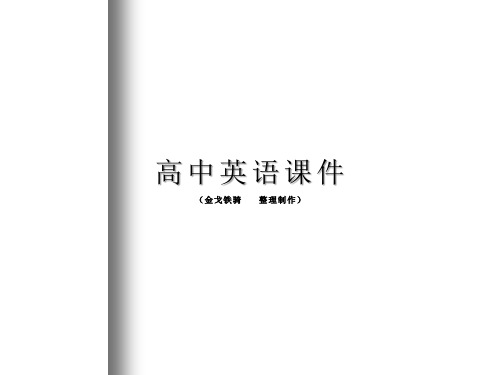
Whatishappeninginthepicture?
高中英语课件
(金戈铁骑 整理制作)
Unit5FirstAid
Wordsandexpressions
FirstAid
Wordspreview
radiation mild
mildly pan
stove tissue swell
n.辐射;射线 adj.轻微的;温和的 adv.轻微地;温和地 n.平底锅;盘子 n.炉子;火炉 n.组织;手巾纸 vt.&vi.膨胀;隆起
Firstaidisimportantforthevictims(受害 者),andnecessaryforustolearnabout.
Warmingup
Discussingroups withthematerials
Hisnoseisbleeding.
Hehasanosebleed. anosebleed
Wordspreview
scissors n.剪刀 unbearable adj.难以忍受的
basin n.盆;盆地 bandage n.绷带
vital adj.至关重要的; 生死攸关的
electricshock 触电;电休克 squeeze…out 榨出;挤出
Whatisfirstaid?
Firstaidisa__t_e_m_p_o_r_afroyrmofhelpgiventosomeonew
- 1、下载文档前请自行甄别文档内容的完整性,平台不提供额外的编辑、内容补充、找答案等附加服务。
- 2、"仅部分预览"的文档,不可在线预览部分如存在完整性等问题,可反馈申请退款(可完整预览的文档不适用该条件!)。
- 3、如文档侵犯您的权益,请联系客服反馈,我们会尽快为您处理(人工客服工作时间:9:00-18:30)。
人教版高中英语必修5
Unit 3 Life in the Future教学设计
西安高级中学李龙涛
Period 3: Using language
Teaching Aims:
1. Learn some new words and expressions.
2. Encourage students to master the features of the two alien creatures, and try to compare the similarities and difference between them.
3. Train the students’ reading skills and predict the future humans.
Teaching Methods:
1.Prediction
2.Pair work & group work
parison
Step 1 Lead-in
1.The teacher shows a video clip from Star War to the students.
2.The teacher shows some pictures of those mentioned creatures from the video clip and ask some questions.
Q1: Where do those creatures live? Galaxy, planet
Q2: How are they different from us humans?
Q3: What do they eat and drink?
Q4: Which language do they speak?
【设计说明】
该部分阅读是上一课阅读材料的延续,主要谈及Li Qiang在太空中遇见的两类令人惊讶的生物。
因内容与《星球大战》中形态怪异的太空生物有所类似,故笔者采取影片《星球大战》片段导入,通过对太空生物的生理形态及生活的预测讨论引出课文内容。
Step2 Prediction and understanding of the title
The teacher asks the students to talk about their own understanding of the title, and try to predict what kinds of amazing creatures will Li Qiang come across in AD 3005.
【设计说明】
引出课文内容后,首先让学生就题目发表讨论,预测作者在跨时空旅行中将会遭遇哪些形态各异的生物。
Step3 Reading for details
1.Ask the students to describe the space station.
Q1: What does the space station look like?
Q2: How about the inside of the space station?
Q3: What can you see inside the station?
2.Ask the students to read through the following two passages and finish the following questions:
Q1: What two alien creatures are mentioned in the text?
Q2: What are the features of these two amazing creatures?
【设计说明】
由于文章结构清晰,内容简单,主要介绍了Li Qiang在太空中遇见的两类生物以及它们之间的比较。
故笔者直接处理课文细节,让学生通过阅读找出文中对两类生物的描述,比较它们的特征。
Step4 Discussion
The teacher asks the students to predict about the future humans by referring to the following questions.
Q1: When do the future humans live?
Q2: Where do they live?
Q3: What do they eat?
Q4: Do their body parts have any other special functions?
Q5: What are the features of the future humans?
Q6: How do future humans work and live?
【设计说明】
文章原先安排的任务是猜测并绘出外星人的模样,并用文字描述将外星人的外形特征;由于考虑到这个任务的难度,笔者将任务改为对未来人类的预测,并提供问题提示,降低难度,将话题从漫无边际的想象转至日常生活,最大程度地调动学生想象的积极性。
Step5 Assignment
Draw a picture of the future humans, then write a description based on your drawing. 【设计说明】让学生参考文章结构与内容,用文字表述未来人类在生理、心理、生活、工作等方面的特点与变化,并将自己的设计做成Powerpoint文件,在第四课时中上台展示。
